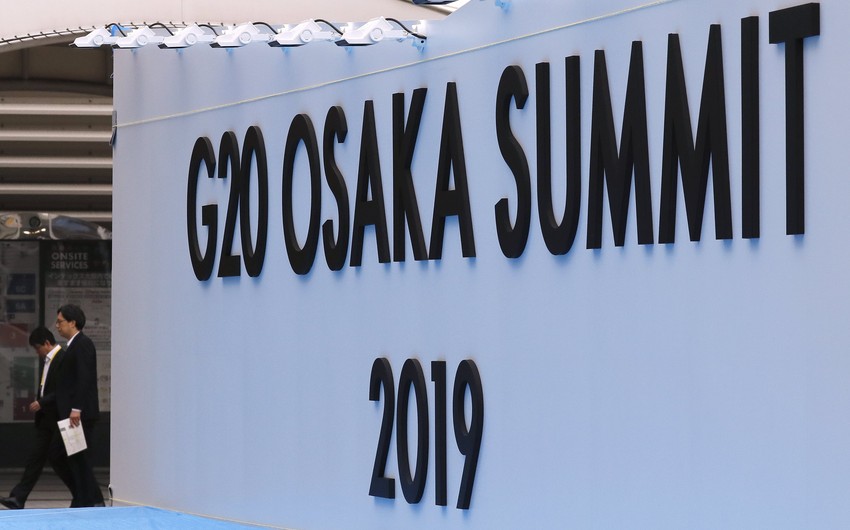The G20 summit will bring together the leaders of 37 countries and international organizations in Osaka, Japan, on June 28-29. A total of 30,000 people will visit Osaka to attend or cover the meeting. About 7 thousand local and foreign journalists are accredited to the event.
Report's correspondent dispatched to Osaka informs that US President Donald Trump, President of France Emmanuel Macron, President of China Xi Jinping, Turkish President Recep Tayyip Erdoğan, Russian President Vladimir Putin, the President of South Korea Moon Jae-in, German Chancellor Angela Merkel, Prime Minister of Great Britain Theresa May, the Prime Minister of Canada Justin Trudeau, Prime Minister of Italy Giuseppe Conte, President of the European Council Donald Tusk, President of European Commission Jean-Claude Juncker and others have already confirmed their participation. Heads of states and governments of Chile, Egypt, the Netherlands, Senegal, Singapore, Spain, Thailand and Vietnam will also participate as invited countries.
Moreover, as usual, the G20 meetings will be attended by representatives of various international organizations, including the Financial Stability Board, the International Monetary Fund, the World Trade Organization, the United Nations and the World Bank.

According to him, nearly 30 thousand people, including members of delegations, representatives of security and media are expected to arrive during the G20 summit, which will be held at the international exhibition center INTEX Osaka. The Executive Director for the promotion of the Kansai region noted that traffic in the area of the summit will be limited from June 27 to June 30. Due to the security measures, storage rooms will be unavailable at airports and major metro stations, as well as garbage cans will be removed.
It is the first time that Japan is hosting G20, which is why it will make every effort for the meeting to be held maximally effective, enriching the agenda with the most relevant international issues.
The rocket launch by North Korea pose a threat to the countries of the region.
In this regard, it seems not accidental that the first visit of President Xi Jinping to the DPRK in 14 years took place a week before the G20 summit.
The official representative of the US State Department Morgan Ortagus announced in advance that the issue of denuclearization of the DPRK would be discussed during the meeting of US President Donald Trump with Japanese Prime Minister Shinzo Abe within the G20 summit in Osaka.
The summit in Osaka will become a platform for another important meeting of US President Donald Trump with Chinese President Xi Jinping, where the trade conflict between these two largest economies of the world will be discussed. Trump announced about this meeting on his microblog on Twitter last week, noting that he had a conversation with the Chinese leader on the phone, which was "excellent".
Another urgent topic of the summit will be the issue of Iran. As Chief Cabinet Secretary Yoshihide Suga said at a press briefing in Tokyo that the Japanese government "will continue to make diplomatic efforts to stabilize the situation, as well as to reduce tension in the Middle East as a whole in cooperation with the United States and other interested countries."
According to Suga, Tokyo is concerned about the aggravation of the situation in the region and the increased threat to the safety of transportation of goods and raw materials through the Strait of Hormuz.
Moreover, another important topic to be discussed during the summit will be the reform of the World Trade Organization (WTO). The need for reforms in this organization is indicated by the situation regarding the Appellate Body for the consideration of controversial cases. Japan intends to promote the WTO reform by preventing the rise of protectionism, including unfair trade practices, to restore confidence in the international trading system.
Japan together with the US and the EU, prepared proposals for reforming the notification system in the WTO, for the purpose of improving transparency, which are currently being discussed in Geneva.
The issue of climate change and the fight against plastic pollution of the seas will also be a priority topic for the Japanese presidency of the G-20.
According to statistics for 2010, 46% of the plastic pollution of the seas falls on the countries of the “Big Twenty”, so it is not surprising that this topic will be raised by Japan during the upcoming summit.
The most relevant topics are the prevention of pollution of the seas, as well as effective management, waste management and innovation in reducing emissions and recycling plastic waste.
Kaoru Magosaki, Director of Climate Change Division of Japan, stressed the importance of introducing innovative technologies on the 3R principle (Reduce, Reuse, Recycle - reduce, reuse and recycle) and develop alternative materials to reduce plastic pollution of the seas.
According to him, an agreement was reached on joint actions to prevent pollution of the seas with plastic at the G20 Ministerial Meeting on Energy Transitions and Global Environment on June 15-16: "We also expect that statements and ideas on this issue will be made during the summit," Magosaki said. He noted that Japan was also cooperating with a number of other countries, such as Bangladesh, the Dominican Republic, in implementing improvement projects. Efficiency of waste management.
The Japanese police introduced the highest level of security measures before the G20 summit.
Up to 32,000 police officers have been mobilized to protect the summit venue, hotels, airports and other places. Checking of vehicles started around the venue of the summit – the international exhibition complex INTEX in Osaka.
Police officers from other prefectures throughout the country are sent to the city to provide security measures against possible terrorist attacks.
In connection with the summit, the city will impose serious restrictions on transport, as well as the use of storage chambers at large railway stations will be prohibited.
The Tokyo police are also strengthening security measures at important sites in the capital city, such as railway stations and other places.


